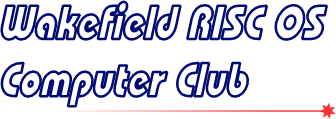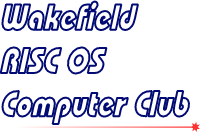Meeting: “PD” Software Night
WROCC member Steve Fryatt, who writes the monthly ‘Free to Share’ column in Archive Magazine, showed us some of his favourite bits of freeware, shareware and free software from the past eighteen months. The software demonstrated included David Pilling’s recently-updated Snapper, Chris Johnson’s ID3TagEd, and Sine Nomine’s House of Cards.
Report by Rick Sterry
The meeting saw Steve Fryatt demonstrate a number of pieces of freeware, shareware and open source software. He was using a laptop running RPCemu under Ubuntu Linux.
Things didn’t start well, when the first application to be demonstrated did precisely nothing – not even an error message. This was Hedwig by Jan-Jaap van der Geer, an unusual desktop bookmark store, search tool and application launcher. It had worked earlier, apparently (isn’t it always the way?) and its failure to perform to an audience may have been an issue to do with RPCemu. I am not sure what the significance of the name Hedwig is – it is a German female’s name (short form Hedy, as in Hedy Lamarr), derived from words meaning battle and fight, and it is also the name of Harry Potter’s pet snowy owl. Apart from that, I have no idea!
[Interviewed by Jim Nagel in Archive 21.8 last year, Jan-Jaap revealed the answer to this. Hedwig was inspired by a freeware tool for Windows called Colibri. When stuck for a name for his RISC OS utility, Jan-Jaap decided to stick with birds (a Colibri being a type of hummingbird) and, given the link between Acorn and the BBC Owl, borrowing the name of a different – and more feathery – film-star to the one that Rick is thinking of apparently seemed like a good idea. – SF]
Hedwig can be downloaded at Jan-Jaap’s website and is what has come to be called ‘emailware’, that is, you are encouraged to send the author an email in lieu of payment or registration. (When is registration not registration, I ask myself?) Apparently, there is also such a thing as postcardware, whereby you are encouraged to send the author a postcard of or from your home town!
Desktop utilities
There was no such reluctance to run by Transient, a utility application that provides what you might call ‘semi-permanent temporary storage’. Steve described this in some detail in last month’s newsletter. I did wonder if it could encourage rather sloppy file ‘housekeeping’, but Steve did make a good case for having a daily temporary folder for installation file downloads, images needed for documents, and other things that tend to clutter up working folders even though you may never need them again. I have not been able to find a Windows equivalent so far, but this may simply be due to the difficulty of choosing the optimum key words for a search.
Director is a flexible desktop enhancement, offering menus showing disc contents, recently used files, shortcuts, and more. It is now published under the GPL (General Public Licence), and can be found on SourceForge.
Dick Tanis’s SmartMenu allows menus opened towards the right-hand side of the screen to be navigated right-to-left instead of left-to-right. This overcomes the problem of menus and submenus opening on top of the parent when there is no more desktop space to the right. It is curious that this hasn’t been fixed in RISC OS years ago – why, even Windows does it right! SmartMenu is freeware.
Presentations and screenshots
Next was Fade, by Richard Windley of The Really Small Software Company. This is a basic slideshow and presentation system, with a very nice graphical representation of the different slides and the fade types between them, making good use of drag-and-drop. Although not as advanced as Powerpoint on the Windows platform (who among us has not at one time or another suffered from “Death by Powerpoint”), it is delightfully easy to use. Slideshows can be exported as individual slides, or as HTML with or without Previous/Next navigation buttons. Fade can be found under ‘Software: Presentation’ on TRSSC’s website. The site contains many other useful pieces of software, including games, font management, audio tools, database and development tools.
After that came Snapper, a versatile screen-grab utility originally produced by David Pilling, and now developed further by Chris Johnson and released as freeware. I seem to remember having a copy of the original Snapper bundled with the ImageMaster and Twain driver software that was used with my Mustek SCSI flatbed scanner. (Due to copyright issues, so I suspect, David now supplies software referred to rather coyly as “Scanning software” or “Bitmap manipulation software”.) Snapper has useful features, such as the ability to capture menus without the item under the pointer being highlighted, and to capture submenus too. Copies can be found on Chris’s website
Also available from Chris’s site is ID3TagEd, a flexible ID3 tag editor for manipulating artist and title information in MP3 audio files. It contains a range of useful facilities for manipulating both the original, and somewhat restricted, v1 tags as well as the more flexible, but less RISC OS-friendly, v2 format.
Steve showed how it could be used to copy information between the two tag formats, update the details in various ways, extract information from filenames, and even rename files and sort them into directories based on the contents of their ID3 tags. As well as operating on individual files, the utility has a batch mode that can be used to update directories full of audio tracks. Steve commented that, despite looking, he had yet to find a utility as good on any other platform – meaning that he often uses ID3TagEd to process files stored on a Linux machine.
Changes to RISC OS
Steve briefly talked about the version of Paint released by RISC OS Open Ltd and available to download from their website. Apart from the drag-and-drop of sprites from sprite file windows, all of the changes that were demonstrated also seem to be in the RISC OS Six version of Paint from RISCOS Ltd. One welcome improvement is that when selecting an area of the sprite, the bounding box snaps to the pixel grid, thus removing the ambiguity as to precisely which pixels are being included in the selection. As with the opening of submenus mentioned in connection with SmartMenu, I am amazed that this obvious shortcoming was not fixed years ago.
“And finally...”
Last up for demonstration that evening were two games from Hilary Phillips of Sine Nomine software. (Just to digress for a moment, ‘sine nomine’ is a Latin expression meaning ‘no name’, often used in publishing. Matthew Phillips did explain his reasons for choosing such an unusual name, but it’s a bit lengthy to insert here!) The first game, or suite of games more accurately, was SuperDoku. The clue is in the name – this is a Sudoku generating and solving application. You can create your own puzzles, or have ones created for you.
When solving them, you can go it alone, or take advantage of hints ranging from subtle to anything but. Apart from a simple square-shaped puzzle, SuperDoku can generate ones of more fiendish complexity, enough to daunt all but the bravest of souls. As my brain seems to be wired in the wrong way for this sort of thing, almost any sort of mathematical puzzle leaves me cold, and my eyes started to glaze over as even Steve said he would have to be very bored in order to tackle a lot of the SuperDoku puzzles! However, if you are into this sort of thing then you will be in Seventh Heaven.
The second was a suite of forty one desktop Patience games, called House of Cards. Not being a card player myself (my brain isn’t wired for that either), the features rather went over my head. However, I did understand that the program will allow you to cheat if you feel so inclined! Game scripts can be imported from Philippe Donsback’s SPatience, thus increasing the number of games available.
Both games are shareware, and can be registered (online or by cheque) for £5 each. Demo versions can be downloaded from Sine Noimine’s website, along with a lot of other useful shareware and freeware.
Where to download the software
All of the software covered in the meeting can be downloaded from the internet from the sites listed here.
- Director – Nick Craig Wood and The Director Developers
- director.sourceforge.net
- Fade – Richard Windley (The Really Small Software Company)
- www.reallysmall.co.uk
- Hedwig – Jan-Jaap van der Geer
- home.c2i.net/jjvdgeer/riscos
- House of Cards – Hilary Phillips (Sine Nomine Software)
- www.sinenomine.co.uk/software
donsback.perso.worldonline.fr (for SPatience and its games) - ID3TagEd – Chris Johnson
- www.chris-johnson.org.uk/software
- Paint – RISC OS Open Ltd
- www.riscosopen.org/content/downloads/desktop-zipfiles
- SmartMenu – Dick Tanis
- www.theochem.ru.nl/~dtanis/riscos.html
- Snapper – David Pilling and Chris Johnson
- www.chris-johnson.org.uk/software
- SuperDoku – Hilary Phillips (Sine Nomine Software)
- www.sinenomine.co.uk/software
- Transient – Alisdair McDiarmid and Fred Graute
- www.stronged.iconbar.com/fjg
Meeting resources
There are more resources for this meeting if you are a WROCC member: log in to view them.







